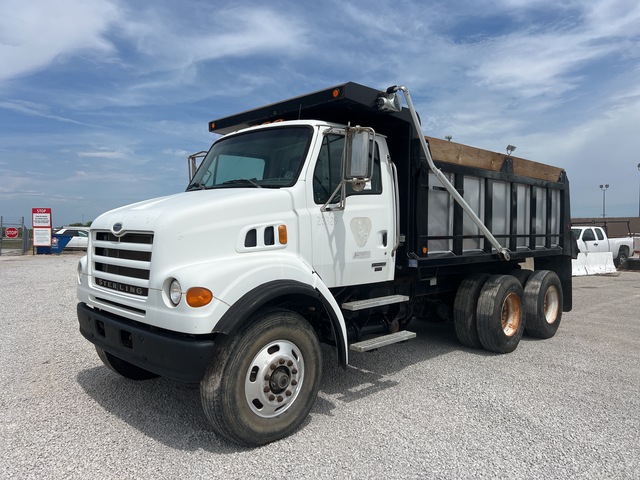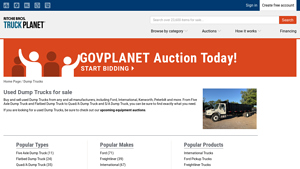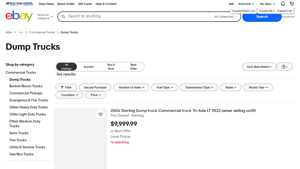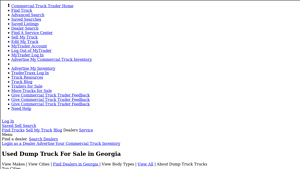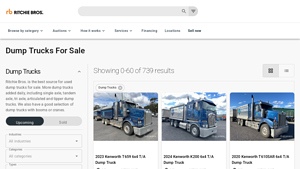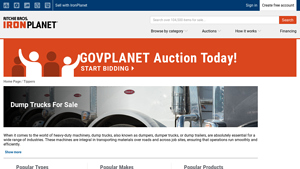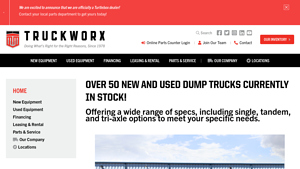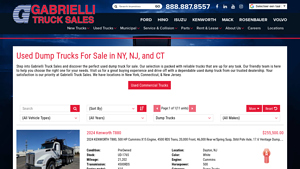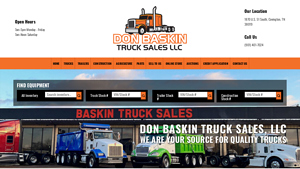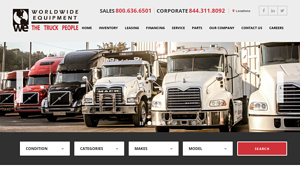Introduction: Navigating the Global Market for used Dump Truck
In today’s global marketplace, sourcing used dump trucks presents a unique set of challenges for international B2B buyers, particularly in regions like Africa, South America, the Middle East, and Europe. With a myriad of options available—from single axle to tri-axle dump trucks—buyers must navigate a complex landscape that includes varying regulations, fluctuating prices, and diverse supplier reliability. This guide aims to simplify that process, offering a comprehensive overview of the types, applications, and procurement strategies for used dump trucks.
Throughout this guide, we delve into critical aspects such as identifying the right type of dump truck for specific projects, understanding the applications suited for each model, and establishing criteria for vetting suppliers effectively. Additionally, we’ll explore cost considerations and financing options to ensure that buyers can make informed decisions that align with their budgetary constraints.
By leveraging the insights provided in this guide, B2B buyers will be better equipped to navigate the intricate global market for used dump trucks. Whether you are operating in the bustling construction sectors of Brazil or the evolving infrastructure landscapes of the Middle East, this resource empowers you to make strategic purchasing decisions that will enhance operational efficiency and drive project success.
Understanding used Dump Truck Types and Variations
| Type Name | Key Distinguishing Features | Primary B2B Applications | Brief Pros & Cons for Buyers |
|---|---|---|---|
| Single Axle Dump Truck (S/A) | One axle in the rear, typically lighter payload capacity. | Small construction projects, landscaping. | Pros: Maneuverable, lower purchase costs. Cons: Limited load capacity. |
| Tandem Axle Dump Truck (T/A) | Two axles in the rear, balanced load distribution. | Medium to large construction projects, roadwork. | Pros: Higher payload capacity, better stability. Cons: Less maneuverable than S/A. |
| Tri Axle Dump Truck (Tri/A) | Three axles in the rear, designed for heavy loads. | Heavy construction, mining, large-scale projects. | Pros: Excellent load capacity, stability. Cons: Higher maintenance costs. |
| Articulated Dump Truck (ADT) | Jointed design for enhanced maneuverability and traction. | Off-road construction, mining, rough terrain. | Pros: Great in rough terrains, versatile. Cons: More complex mechanics, higher initial costs. |
| Quad Axle Dump Truck (Quad/A) | Four rear axles, designed for maximum load capacity. | Heavy-duty construction, waste management. | Pros: Highest payload capacity, stability. Cons: Difficult to maneuver in tight spaces, higher costs. |
What Are the Characteristics of Single Axle Dump Trucks (S/A)?
Single Axle Dump Trucks are designed with one axle at the rear, making them lighter and more maneuverable than their multi-axle counterparts. They are best suited for smaller construction projects, landscaping, and local deliveries where tight spaces are a concern. When considering a purchase, buyers should evaluate the truck’s payload capacity, typically lower than other types, which may limit its use in larger projects. However, their lower purchase price makes them an attractive option for businesses with smaller budgets or specific applications.
How Do Tandem Axle Dump Trucks (T/A) Fit into B2B Operations?
Tandem Axle Dump Trucks feature two rear axles, providing a balanced load distribution that enhances stability and increases payload capacity. These trucks are ideal for medium to large construction projects and roadwork, where heavier loads are common. Buyers should consider their maneuverability, which is less than single axle trucks but still adequate for most job sites. The investment in a T/A truck is justified by its versatility and ability to handle a range of materials effectively.
What Makes Tri Axle Dump Trucks (Tri/A) a Preferred Choice for Heavy Projects?
Tri Axle Dump Trucks are equipped with three rear axles, making them suitable for transporting heavy loads, particularly in heavy construction, mining, and large-scale projects. Their design offers excellent stability and load capacity, which are critical in demanding environments. However, potential buyers should be aware of the higher maintenance costs associated with these trucks due to their complexity and heavier use. Investing in a Tri/A truck is a strategic choice for businesses focused on heavy-duty applications.
Why Choose Articulated Dump Trucks (ADT) for Challenging Terrain?
Articulated Dump Trucks are characterized by their jointed design, allowing for superior maneuverability and traction in rough terrain. They are particularly effective in off-road construction and mining operations, where conditions can be unpredictable. Buyers should consider the complexity of the mechanics involved, which can lead to higher initial costs. However, the versatility and capability of ADTs make them a valuable addition to any fleet that frequently operates in challenging environments.
What Are the Advantages of Quad Axle Dump Trucks (Quad/A)?
Quad Axle Dump Trucks are designed with four rear axles, providing maximum load capacity and stability, making them ideal for heavy-duty construction and waste management applications. While they excel in load-bearing capabilities, potential buyers should note that their size can make them challenging to maneuver in tight spaces. The higher costs associated with Quad/A trucks are often offset by their efficiency and ability to handle substantial loads, making them a worthwhile investment for businesses engaged in large-scale operations.
Key Industrial Applications of used Dump Truck
| Industry/Sector | Specific Application of used Dump Truck | Value/Benefit for the Business | Key Sourcing Considerations for this Application |
|---|---|---|---|
| Construction | Hauling construction materials | Efficient transport of heavy loads | Ensure the truck can handle specific weight capacities and terrain. |
| Mining | Transporting extracted minerals | Streamlined operations and reduced downtime | Look for durability and maintenance history to ensure reliability in harsh conditions. |
| Agriculture | Moving soil, fertilizers, and crops | Improved logistics and productivity | Assess the truck’s payload capacity and compatibility with agricultural equipment. |
| Waste Management | Collecting and transporting waste | Enhanced waste disposal efficiency | Check for compliance with environmental regulations and capacity for specific waste types. |
| Infrastructure Development | Transporting asphalt and aggregates | Timely project completion and cost savings | Verify the truck’s ability to operate in varied terrains and its load distribution capabilities. |
How is a Used Dump Truck Utilized in the Construction Industry?
In the construction sector, used dump trucks are essential for transporting materials like gravel, sand, and concrete. Their robust design allows for efficient hauling over rough terrain, which is common on job sites. B2B buyers in this industry should prioritize trucks with high payload capacities and reliable engines to ensure they can meet the demands of heavy loads and extended operational hours. Additionally, the ability to navigate different surfaces is crucial, especially in developing regions where infrastructure may be lacking.
What Role Do Used Dump Trucks Play in Mining Operations?
In mining operations, used dump trucks are vital for moving extracted minerals from the site to processing facilities. Their ability to handle heavy loads while maintaining stability is a significant advantage. Buyers in the mining sector must consider the truck’s durability and maintenance history, as these vehicles often operate in harsh environments. Selecting trucks that can withstand the rigors of mining activities can minimize downtime and enhance overall productivity.
How Are Used Dump Trucks Applied in Agriculture?
Agricultural operations utilize used dump trucks for transporting soil, fertilizers, and harvested crops. This application enhances logistics and ensures timely delivery of essential materials. Buyers from the agricultural sector should focus on trucks that offer sufficient payload capacity and compatibility with other farming equipment. Additionally, the ability to operate on uneven terrain is a critical consideration, particularly in rural areas where roads may not be well maintained.
Why Are Used Dump Trucks Important for Waste Management?
In waste management, used dump trucks are employed to collect and transport waste materials to disposal sites. Their design facilitates the efficient handling of various waste types, contributing to enhanced waste disposal processes. B2B buyers in this sector must ensure that the trucks comply with local environmental regulations and are equipped to manage specific waste types, such as hazardous materials. Reliability and capacity are also key factors, as they directly affect operational efficiency.
How Do Used Dump Trucks Support Infrastructure Development?
Infrastructure development projects rely on used dump trucks to transport materials such as asphalt and aggregates essential for road construction and maintenance. These trucks help ensure timely project completion while potentially reducing costs. Buyers should evaluate the truck’s performance on different terrains and its load distribution capabilities to ensure it can meet the specific needs of infrastructure projects. The right dump truck can significantly impact the efficiency and success of development initiatives.
3 Common User Pain Points for ‘used Dump Truck’ & Their Solutions
Scenario 1: Navigating Uncertainty in Equipment Condition
The Problem: B2B buyers of used dump trucks often face anxiety regarding the true condition of the equipment. When purchasing from a distance, especially across international borders, buyers are unable to conduct hands-on inspections. They worry about hidden mechanical issues that could lead to costly repairs or downtime. This uncertainty can result in hesitation or even lost opportunities to secure the right truck for their operations.
The Solution: To mitigate this risk, buyers should seek out reputable dealers who offer comprehensive vehicle history reports and inspection certifications. Platforms that provide “IronClad Assurance” or similar guarantees give buyers a level of confidence in their purchase. Prioritize sourcing from auction sites with transparent bidding processes and established reputations, like Ritchie Bros. or TruckPlanet. Additionally, consider hiring a third-party inspector to evaluate the truck before purchase. This proactive step can uncover potential issues and provide a clearer understanding of the truck’s condition, ensuring that your investment is sound.
Scenario 2: Overcoming Limited Availability of Specific Models
The Problem: In many regions, the availability of specific dump truck models can be limited, particularly if buyers are seeking specialized features such as articulated trucks or those equipped with cranes. This scarcity can lead to inflated prices or the necessity to compromise on features that are critical for their operational needs. Buyers may feel pressured to purchase suboptimal equipment simply to fill a gap in their fleet.
The Solution: To navigate this challenge, buyers should adopt a multi-faceted sourcing strategy. Begin by expanding your search parameters to include various online marketplaces and auction platforms that operate internationally. Utilize advanced filtering options to find trucks that meet your specific requirements, and consider alerts for new listings that match your criteria. Networking with industry contacts and attending trade shows can also uncover potential sellers who may have the desired equipment. If necessary, be open to purchasing trucks that may require retrofitting to meet your needs, as this can often be a more cost-effective solution compared to settling for less suitable models.
Scenario 3: Understanding Import Regulations and Logistics
The Problem: For international buyers, navigating the complex web of import regulations and logistics can be daunting. Different countries have varying requirements for importing used vehicles, including emissions standards and paperwork, which can lead to delays and unexpected costs. This complexity can deter potential buyers from making a purchase or result in costly mistakes that can jeopardize their operations.
The Solution: To effectively manage this aspect of the purchasing process, it is crucial to conduct thorough research on the import regulations specific to your country. Collaborate with a customs broker who specializes in heavy equipment imports to ensure compliance with all necessary regulations. They can provide guidance on documentation, duties, and taxes, thereby streamlining the import process. Furthermore, consider partnering with suppliers who have experience in international transactions and can assist in navigating logistics. Establishing clear communication with your supplier regarding shipping timelines and potential costs will also help in managing expectations and ensuring a smoother acquisition process.
Strategic Material Selection Guide for used Dump Truck
What Are the Common Materials Used in Dump Truck Construction?
When selecting a used dump truck, understanding the materials used in its construction is crucial for ensuring performance, durability, and compliance with international standards. Here, we analyze four common materials: steel, aluminum, composite materials, and rubber, focusing on their properties, advantages, disadvantages, and implications for international buyers.
How Does Steel Impact Dump Truck Performance?
Steel is the most widely used material in dump truck construction, particularly for the chassis and body. Its key properties include high tensile strength, excellent impact resistance, and good weldability, making it suitable for heavy-duty applications. Steel can withstand high temperatures and pressures, which is vital for trucks operating in demanding environments.
Pros: Steel is durable and cost-effective, providing a long lifespan with proper maintenance. It is also readily available, making it easier for buyers to find replacement parts.
Cons: On the downside, steel is prone to corrosion, especially in humid or saline environments, which can increase maintenance costs. Additionally, it is heavier than other materials, which may affect fuel efficiency.
Impact on Application: Steel is compatible with various media, including aggregates and liquids, making it versatile for different hauling tasks. However, buyers should consider protective coatings to enhance corrosion resistance.
What Role Does Aluminum Play in Dump Truck Design?
Aluminum is increasingly popular in dump truck construction, particularly for bodies and trailers. Its lightweight nature contributes to better fuel efficiency and payload capacity. Key properties include high corrosion resistance and excellent strength-to-weight ratio.
Pros: The primary advantage of aluminum is its resistance to rust, which is beneficial for trucks operating in wet or coastal regions. Its lightweight nature allows for higher payloads, translating to increased profitability.
Cons: However, aluminum can be more expensive than steel, and its manufacturing process is more complex, which can lead to higher initial costs. Additionally, while it is strong, it may not withstand impacts as well as steel.
Impact on Application: Aluminum is suitable for transporting a variety of materials, but buyers should ensure that the specific aluminum alloy used meets the necessary strength requirements for their intended applications.
How Do Composite Materials Enhance Dump Truck Functionality?
Composite materials, often used in specialized dump truck applications, combine different materials to achieve specific performance characteristics. Key properties include high strength, low weight, and excellent resistance to corrosion and environmental factors.
Pros: Composites can significantly reduce the overall weight of a dump truck, enhancing fuel efficiency and payload capacity. They also offer superior resistance to corrosion and wear, leading to lower maintenance costs.
Cons: The primary disadvantage is the higher cost of composite materials and the complexity of manufacturing processes. Additionally, they may not be as widely available as traditional materials, making repairs more challenging.
Impact on Application: Composites are particularly useful for trucks that operate in harsh environments, such as mining or construction sites, where exposure to corrosive materials is common. Buyers must ensure that the composites used are compatible with the specific materials they will be hauling.
What Is the Importance of Rubber in Dump Truck Construction?
Rubber is primarily used for tires and suspension components in dump trucks. Its key properties include excellent shock absorption, flexibility, and wear resistance, which are essential for maintaining stability and comfort during operation.
Pros: Rubber tires provide superior traction and handling, especially on uneven terrain, making them ideal for construction and off-road applications. They also contribute to a smoother ride, reducing operator fatigue.
Cons: However, rubber is susceptible to wear and tear, particularly in harsh environments, which can lead to frequent replacements. Additionally, rubber components can degrade over time due to UV exposure and extreme temperatures.
Impact on Application: Rubber is crucial for ensuring the dump truck can navigate various terrains effectively. Buyers should consider the specific tire specifications and tread patterns suitable for their operational needs.
Summary of Material Selection for Used Dump Trucks
| Material | Typical Use Case for used Dump Truck | Key Advantage | Key Disadvantage/Limitation | Relative Cost (Low/Med/High) |
|---|---|---|---|---|
| Steel | Chassis and body | Durable and cost-effective | Prone to corrosion | Low |
| Aluminum | Truck bodies and trailers | Lightweight and corrosion-resistant | Higher initial cost | Medium |
| Composite | Specialized applications | High strength and low weight | Expensive and complex manufacturing | High |
| Rubber | Tires and suspension components | Excellent traction and shock absorption | Susceptible to wear and environmental damage | Medium |
This guide provides a comprehensive overview of material selection, helping international buyers make informed decisions when purchasing used dump trucks. Understanding these materials’ properties and implications can lead to better performance and cost-efficiency in their operations.
In-depth Look: Manufacturing Processes and Quality Assurance for used Dump Truck
What Are the Main Stages of Manufacturing Used Dump Trucks?
The manufacturing process of used dump trucks involves several critical stages that ensure the vehicles are built to meet industry standards and are capable of performing in demanding environments. The main stages include material preparation, forming, assembly, and finishing.
Material Preparation: This initial stage involves sourcing high-quality materials such as high-strength steel for the truck’s chassis, aluminum for the body, and various polymers for interior components. Manufacturers often prioritize materials that provide durability and resistance to corrosion, especially for trucks intended for use in harsh climates, such as those prevalent in Africa and South America.
Forming: In this stage, the prepared materials are shaped into components. Techniques such as stamping, welding, and bending are commonly employed. For example, the truck’s chassis is typically fabricated through a combination of welding and bolting processes to ensure structural integrity. Advanced machinery, including CNC (Computer Numerical Control) machines, is often utilized to achieve precise dimensions and enhance productivity.
Assembly: This is where the formed components are brought together to create the finished vehicle. Key assemblies include the drivetrain, braking system, and hydraulic components for the dump mechanism. Quality control checkpoints are integrated throughout this stage to verify that each component meets the required specifications before moving to the next phase.
Finishing: The final stage involves surface treatment, painting, and application of any protective coatings. This not only enhances aesthetic appeal but also provides protection against environmental factors, which is particularly important in regions with extreme weather conditions. Rigorous testing is conducted to ensure that the paint and coatings adhere properly and offer the necessary protection.
How Is Quality Assurance Implemented in the Manufacturing of Used Dump Trucks?
Quality assurance (QA) is critical in the manufacturing of used dump trucks, ensuring that each vehicle meets international and industry-specific standards.
International Standards: Most manufacturers adhere to ISO 9001, which outlines the requirements for a quality management system. Compliance with this standard indicates that the manufacturer is committed to continuous improvement and customer satisfaction. Additionally, industry-specific standards such as CE marking in Europe and API standards in the oil and gas sector are crucial for dump trucks that will be used in these contexts.
Quality Control Checkpoints: The quality control process typically includes several checkpoints:
-
Incoming Quality Control (IQC): This involves inspecting raw materials and components upon arrival at the manufacturing facility to ensure they meet specified standards. B2B buyers should request IQC reports to verify the quality of the materials used in their trucks.
-
In-Process Quality Control (IPQC): During the assembly process, inspections are conducted to ensure that each component is assembled correctly and functions as intended. This includes testing the hydraulic systems and ensuring that safety features are operational.
-
Final Quality Control (FQC): Before the dump truck is delivered, a comprehensive inspection is performed to check for overall functionality, safety, and compliance with regulatory standards. This may involve road tests and performance assessments to evaluate the vehicle’s capabilities.
What Testing Methods Are Commonly Used to Ensure Quality in Dump Trucks?
Various testing methods are employed throughout the manufacturing process to ensure the quality and reliability of used dump trucks. Some common methods include:
-
Load Testing: This assesses the truck’s capacity to carry heavy loads, simulating real-world conditions to ensure that structural components can withstand operational stress.
-
Hydraulic System Testing: Given the importance of the hydraulic mechanisms in dump trucks, these systems are rigorously tested for leaks and performance under pressure.
-
Brake Testing: Safety is paramount, so thorough testing of the braking system is conducted to ensure it meets safety standards and performs effectively in all conditions.
-
Environmental Testing: Trucks are often subjected to extreme temperature and humidity conditions to test their durability and performance in various climates.
How Can B2B Buyers Verify Supplier Quality Control Practices?
For international B2B buyers, particularly those in Africa, South America, the Middle East, and Europe, verifying supplier quality control practices is essential to ensure they receive reliable products. Here are some actionable steps buyers can take:
-
Request Documentation: Buyers should ask for quality assurance documentation, including ISO 9001 certificates and reports from quality control checkpoints (IQC, IPQC, FQC). This documentation provides insight into the supplier’s commitment to quality.
-
Conduct Audits: Engaging in supplier audits can help buyers assess the manufacturing processes and quality control practices firsthand. This includes visiting the production facility to observe operations and verify compliance with quality standards.
-
Third-Party Inspections: Utilizing independent third-party inspection services can provide an objective evaluation of the dump trucks before purchase. These inspections can cover everything from material quality to final assembly checks.
What Are the Nuances of Quality Control Certification for International Buyers?
For B2B buyers operating internationally, understanding the nuances of quality control certification is crucial. Different regions may have varying regulatory requirements, and compliance with local standards can significantly impact the usability of the dump trucks. For example, European buyers must ensure that products meet CE marking requirements, which signify compliance with EU safety, health, and environmental protection standards.
Moreover, understanding the differences in certification processes and quality expectations can help buyers make informed decisions. Buyers should engage with suppliers who are knowledgeable about their specific market requirements and can provide appropriate certifications and documentation.
In conclusion, the manufacturing processes and quality assurance practices in the production of used dump trucks are fundamental to delivering reliable and durable vehicles. For B2B buyers, especially those in diverse regions, being well-informed about these processes can lead to more successful purchasing decisions and long-term partnerships with suppliers.
Practical Sourcing Guide: A Step-by-Step Checklist for ‘used Dump Truck’
In today’s competitive landscape, sourcing a used dump truck requires careful consideration and strategic planning. This checklist will guide international B2B buyers through the essential steps to ensure a successful procurement process, particularly for markets in Africa, South America, the Middle East, and Europe.
Step 1: Define Your Technical Specifications
Before starting your search, clearly outline the specifications your dump truck must meet. Consider factors such as payload capacity, axle configuration (single, tandem, or tri-axle), and whether you need additional features like a crane or specialized body type. Specific requirements will help narrow down options and ensure you select a truck that meets your operational needs.
Step 2: Research the Market and Pricing
Conduct thorough market research to understand the price range for different makes and models of used dump trucks. Resources like auction websites and dealer listings can provide insights into current market trends and average prices. Make a note of any seasonal fluctuations in pricing that could impact your purchase decision.
Step 3: Evaluate Potential Suppliers
Vetting suppliers is a crucial step to ensure reliability and quality. Look for established dealers or auction houses with a strong reputation in the industry. Request company profiles, references from previous buyers, and any relevant certifications to validate their credibility. This step can help you avoid potential pitfalls associated with unreliable vendors.
Step 4: Inspect the Equipment Thoroughly
When you identify potential trucks, arrange for an in-person inspection or request detailed reports if you are sourcing remotely. Check for signs of wear and tear, inspect the engine, transmission, and hydraulic systems, and review maintenance records. If possible, take the truck for a test drive to assess its performance under real conditions.
Step 5: Review Legal and Compliance Requirements
Ensure that the dump truck meets local regulations and compliance standards in your region. This might include checking emissions standards, weight limits, and safety features. Understanding these legal requirements is essential to avoid future fines or operational disruptions.
Step 6: Negotiate Terms and Conditions
Once you have identified a suitable truck, begin negotiations with the supplier. Discuss pricing, payment terms, warranty options, and any additional services such as delivery or post-sale support. Clear communication during this stage can lead to a more favorable deal and establish a positive relationship with the supplier.
Step 7: Finalize the Purchase and Arrange Logistics
After agreeing on terms, finalize the purchase and arrange logistics for transport. Consider the best shipping options, especially if you’re importing the truck internationally. Ensure all documentation is in order, including the bill of sale and any import/export paperwork, to facilitate a smooth transaction.
By following this checklist, B2B buyers can streamline their sourcing process for used dump trucks, ensuring they make informed decisions that align with their business needs and operational goals.
Comprehensive Cost and Pricing Analysis for used Dump Truck Sourcing
What Are the Key Cost Components for Used Dump Trucks?
When sourcing used dump trucks, understanding the cost structure is essential for effective budgeting and financial planning. The primary cost components include materials, labor, manufacturing overhead, tooling, quality control (QC), logistics, and profit margin.
-
Materials: The type of materials used in the construction of the dump truck significantly impacts costs. Heavy-duty components, such as high-strength steel for the chassis and specialized alloys for the dump bed, can increase the base price.
-
Labor: Labor costs vary depending on the region and the complexity of modifications or repairs. In markets with higher labor costs, such as Western Europe, you might see increased pricing, while regions with lower labor costs may offer better value.
-
Manufacturing Overhead: This includes costs associated with factory operations, including utilities and equipment maintenance. Manufacturers often pass these costs onto buyers, influencing the final price.
-
Tooling: Custom tooling for specific modifications can add to initial costs. If your requirements necessitate specialized designs or features, factor in these additional expenses.
-
Quality Control: Ensuring that a used dump truck meets safety and operational standards is vital. The costs associated with inspections and certifications can vary significantly, impacting the overall pricing.
-
Logistics: Transportation costs are particularly relevant for international buyers. These costs can fluctuate based on distance, shipping method, and customs duties.
-
Margin: Suppliers will include a profit margin in their pricing. This margin can vary significantly based on the supplier’s market positioning and competition.
How Do Price Influencers Affect the Cost of Used Dump Trucks?
Several factors can influence the pricing of used dump trucks, making it crucial for buyers to be aware of these elements:
-
Volume/MOQ: Purchasing in bulk can often lead to discounts. Many suppliers offer better pricing for larger orders, which can be particularly beneficial for companies needing multiple vehicles.
-
Specifications and Customization: Customized features, such as additional hydraulic systems or specialized dump beds, will likely increase the price. Clear communication of your specifications can help suppliers provide accurate quotes.
-
Materials and Quality Certifications: Trucks built with high-quality materials or those that have certifications (like ISO) may come at a premium. However, investing in quality can lead to lower maintenance costs and longer lifespans.
-
Supplier Factors: The reputation and reliability of the supplier can significantly influence pricing. Established suppliers may charge more but often provide better service and warranties.
-
Incoterms: Understanding shipping terms is essential. Different Incoterms can affect the overall cost due to variations in who is responsible for shipping, insurance, and tariffs.
What Buyer Tips Can Help Negotiate Better Prices for Used Dump Trucks?
Negotiating the best price for used dump trucks requires a strategic approach. Here are some actionable tips:
-
Research Thoroughly: Before entering negotiations, gather data on market prices and trends. Websites like Ritchie Bros. and TruckPlanet can provide valuable insights into recent sales and current inventory.
-
Understand Total Cost of Ownership: Consider not just the purchase price but the total cost of ownership, which includes maintenance, fuel efficiency, and potential resale value. This broader perspective can guide you in evaluating the best overall deal.
-
Leverage Competitive Quotes: Obtain quotes from multiple suppliers to create a competitive environment. This can provide leverage during negotiations and help you secure a better price.
-
Be Flexible with Specifications: If possible, consider being flexible with your specifications. Sometimes, opting for slightly older models or different configurations can lead to significant savings.
-
Negotiate Payment Terms: Discuss payment options with suppliers. Flexible payment terms can ease cash flow concerns and make a deal more attractive without necessarily reducing the price.
Conclusion: Why Is It Important to Be Cautious About Indicative Prices?
While indicative prices can provide a baseline for budgeting, they should be viewed as starting points rather than final figures. Fluctuations in market demand, condition of the trucks, and geographic factors can all affect pricing. Always conduct thorough due diligence and consider all cost components and influencers to make informed purchasing decisions.
Alternatives Analysis: Comparing used Dump Truck With Other Solutions
Exploring Alternatives to Used Dump Trucks in Construction and Transportation
When evaluating the best equipment for construction and transportation, businesses often consider various alternatives to traditional used dump trucks. Understanding these alternatives can lead to more informed purchasing decisions that align with specific operational needs and budget constraints. Below, we compare used dump trucks with two viable alternatives: articulated dump trucks and flatbed trucks.
| Comparison Aspect | Used Dump Truck | Articulated Dump Truck | Flatbed Truck |
|---|---|---|---|
| Performance | High load capacity; versatile for various materials | Excellent off-road capability; suited for rough terrains | Good for transporting large, heavy items; flexible loading |
| Cost | Generally lower upfront cost; varies by model and condition | Higher initial investment; long-term ROI through efficiency | Moderate cost; often lower than dump trucks |
| Ease of Implementation | Widely available; easy to integrate into existing fleets | Requires specialized training for operators | Simple to operate; minimal training needed |
| Maintenance | Regular maintenance needed; parts availability can vary | Higher maintenance costs; specialized parts may be required | Lower maintenance; parts are generally easier to source |
| Best Use Case | Ideal for construction sites, road work, and landscaping | Best for mining, quarrying, and off-road applications | Suitable for transporting equipment, materials, and machinery |
What Are the Pros and Cons of Articulated Dump Trucks?
Articulated dump trucks are designed for heavy-duty applications, particularly in off-road environments. One of their primary advantages is their superior maneuverability, making them ideal for navigating challenging terrains. Their capacity for large payloads and robust build quality also contribute to their effectiveness in construction and mining operations. However, the higher upfront cost and specialized maintenance requirements can be a drawback, especially for smaller businesses or those with limited budgets.
How Do Flatbed Trucks Compare?
Flatbed trucks offer a different set of advantages, primarily in their versatility for transporting a wide range of goods. They are particularly effective for hauling large machinery, construction materials, and other bulky items that may not fit in a traditional dump truck. The simplicity of operation and lower maintenance costs make flatbed trucks an appealing option for businesses with diverse transportation needs. However, they lack the ability to carry loose materials securely and may not be suitable for all construction site applications.
How Can B2B Buyers Choose the Right Solution?
When selecting the right solution, B2B buyers should consider their specific operational requirements, budget constraints, and the types of materials they typically handle. For businesses focused on construction and heavy material transport, used dump trucks may provide the best combination of performance and cost-effectiveness. Conversely, if operations frequently involve off-road conditions or require versatile transportation capabilities, investing in articulated dump trucks or flatbed trucks may yield greater long-term benefits. Ultimately, understanding the strengths and weaknesses of each option will help buyers make a decision that aligns with their strategic goals and operational needs.
Essential Technical Properties and Trade Terminology for used Dump Truck
What Are the Essential Technical Properties of Used Dump Trucks?
When considering the purchase of a used dump truck, understanding its technical specifications is crucial for making an informed decision. Here are several key properties to keep in mind:
-
Payload Capacity
This is the maximum weight a dump truck can carry, including the weight of the truck itself. It is typically expressed in tons. Knowing the payload capacity helps buyers assess whether a truck can meet their operational needs, especially in industries like construction and mining where heavy materials are frequently transported. -
Engine Type and Horsepower
The engine type (diesel or gasoline) and its horsepower directly influence the truck’s performance and fuel efficiency. A higher horsepower generally indicates better performance under heavy loads. For B2B buyers, understanding engine specifications helps in evaluating the truck’s capability to handle specific job requirements and terrain. -
Axle Configuration
Dump trucks come in various axle configurations, including single axle (S/A), tandem axle (T/A), and tri-axle (Tri/A). Each configuration affects stability, load distribution, and maneuverability. Buyers must consider the axle configuration in relation to their specific application, such as urban construction or off-road use. -
Body Material and Design
The body of a dump truck is commonly made from steel or aluminum. Steel is heavier and more durable, while aluminum is lighter and offers better fuel efficiency. Understanding the body material is essential for determining the truck’s longevity and maintenance costs. -
Transmission Type
Transmission can be manual or automatic, influencing driving ease and fuel efficiency. Automatic transmissions are generally easier to operate, making them suitable for less experienced drivers. B2B buyers should consider their workforce’s skill level when selecting a transmission type. -
Suspension System
A dump truck’s suspension system, whether air or spring, impacts ride quality and load stability. An effective suspension system minimizes wear and tear on both the truck and the cargo. Buyers should assess the suspension type based on the terrains they will be operating in.
What Are Common Trade Terms in the Used Dump Truck Industry?
Familiarizing yourself with industry jargon can streamline the purchasing process and enhance negotiations. Here are some essential terms:
-
OEM (Original Equipment Manufacturer)
This term refers to the company that originally manufactured the truck or its parts. Understanding OEM specifications is vital for ensuring compatibility when sourcing replacement parts or upgrades. -
MOQ (Minimum Order Quantity)
MOQ represents the smallest number of units a supplier is willing to sell. In the context of used dump trucks, this can be relevant when considering bulk purchases for fleet expansion. Knowing the MOQ helps in budgeting and inventory management. -
RFQ (Request for Quotation)
An RFQ is a document sent to suppliers asking for price quotes on specific goods or services. It is a crucial step in the procurement process, allowing buyers to compare prices and terms from different vendors. -
Incoterms (International Commercial Terms)
These are standardized terms used in international trade to define the responsibilities of buyers and sellers regarding shipping, insurance, and tariffs. Familiarity with Incoterms is essential for B2B transactions, especially when importing used dump trucks from different countries. -
VIN (Vehicle Identification Number)
The VIN is a unique code used to identify individual vehicles. It is essential for verifying the truck’s history, including past ownership, accidents, and repairs. Buyers should always request the VIN to conduct thorough due diligence. -
Tare Weight
This refers to the weight of the dump truck without any load. Understanding tare weight helps in calculating the payload capacity and ensuring compliance with weight regulations.
By grasping these technical specifications and industry terms, B2B buyers can navigate the complexities of purchasing used dump trucks more effectively, ensuring they make sound investments that meet their operational needs.
Navigating Market Dynamics and Sourcing Trends in the used Dump Truck Sector
What Are the Key Trends and Drivers Shaping the Used Dump Truck Market?
The global used dump truck market is witnessing significant growth driven by increasing infrastructure development, particularly in emerging economies across Africa, South America, the Middle East, and Europe. Key trends include a surge in demand for durable and versatile vehicles that can handle a variety of terrains and load types. As construction and mining projects ramp up, particularly in regions such as Brazil and parts of Africa, used dump trucks are becoming essential for meeting operational demands without incurring the high costs associated with new vehicles.
Technological advancements are also influencing sourcing trends. The rise of online auction platforms and marketplaces allows international buyers to access a wider selection of used dump trucks. These platforms facilitate the comparison of different models and prices, making it easier to identify value-for-money options. Moreover, enhanced vehicle diagnostics and telematics are increasingly being integrated into used models, offering buyers insights into vehicle health and performance history, thus reducing the risks associated with second-hand purchases.
Furthermore, the rise of electric and hybrid technologies in the heavy-duty vehicle sector is beginning to impact the used dump truck market. Buyers are becoming more conscious of fuel efficiency and emissions, prompting a shift towards sourcing models that align with sustainability goals. This trend is particularly relevant for buyers in Europe, where stringent environmental regulations are in place.
How Does Sustainability and Ethical Sourcing Impact the Used Dump Truck Sector?
Sustainability is increasingly becoming a focal point for B2B buyers in the used dump truck market. The environmental impact of construction and mining operations has led to a growing emphasis on ethical sourcing and sustainable practices. Buyers are now prioritizing vendors who demonstrate a commitment to reducing their carbon footprint and promoting responsible supply chains.
One way this is being addressed is through the certification of ‘green’ materials and practices. Buyers are encouraged to seek out used dump trucks that are certified for their environmental performance. This includes trucks that utilize eco-friendly components and have undergone refurbishments that enhance their efficiency. Certifications such as the Environmental Product Declaration (EPD) can provide assurance regarding the environmental impact of the trucks being sourced.
In addition to environmental considerations, ethical sourcing also encompasses labor practices and the socio-economic impacts of purchasing decisions. Buyers are increasingly aware of the importance of supporting vendors that adhere to fair labor practices and contribute positively to local economies. This holistic approach not only enhances brand reputation but also aligns with the values of stakeholders and consumers who prioritize corporate social responsibility.
What Is the Historical Context of the Used Dump Truck Market?
The evolution of the used dump truck market can be traced back to the post-World War II era when the construction industry began to expand rapidly. Initially, dump trucks were primarily utilized for basic transportation of materials. However, as urbanization and infrastructure projects gained momentum, the demand for more specialized and durable vehicles surged.
In the 1970s and 1980s, technological advancements led to the development of more efficient and powerful dump trucks, significantly enhancing their capabilities. This evolution continued into the 21st century with the integration of advanced materials and engine technologies, allowing for better fuel efficiency and reduced emissions.
Today, the market for used dump trucks is characterized by a robust supply chain and a global network of buyers and sellers. Auctions and online marketplaces have transformed how these vehicles are traded, providing opportunities for international buyers to access quality used trucks at competitive prices. As the market continues to evolve, understanding its historical context is crucial for making informed purchasing decisions and navigating future trends effectively.
Frequently Asked Questions (FAQs) for B2B Buyers of used Dump Truck
-
1. How do I assess the quality of a used dump truck before purchasing?
To evaluate the quality of a used dump truck, start by reviewing its maintenance history and service records. Check for any signs of rust or damage, particularly in critical areas like the chassis and dump bed. A thorough inspection of the engine, transmission, and hydraulic systems is essential. If possible, arrange for a professional mechanic to conduct a pre-purchase inspection. Additionally, verify the mileage and any modifications made to the truck, as these factors can significantly impact performance and longevity. -
2. What is the best type of used dump truck for construction projects?
The ideal used dump truck for construction projects often depends on the specific requirements of the job. For heavy-duty tasks, a tri-axle or quad-axle dump truck is recommended due to its increased payload capacity and stability. If the project involves tight spaces, a smaller single-axle dump truck may suffice. It’s crucial to consider factors like load capacity, engine power, and the truck’s maneuverability in urban or rough terrains when making your selection. -
3. What are the key considerations when sourcing used dump trucks internationally?
When sourcing used dump trucks internationally, consider the compliance with local regulations and import duties in your country. Research the reputation of the supplier or auction platform and verify their credibility through reviews and ratings. Ensure that the truck meets your specific operational requirements, including load capacity and engine specifications. Additionally, understand the logistics of shipping and handling, including potential delays or costs associated with customs clearance. -
4. How can I verify the legitimacy of a used dump truck supplier?
To verify a used dump truck supplier’s legitimacy, start by checking their business registration and licensing in their respective country. Look for online reviews or testimonials from previous buyers to assess their reputation. A reputable supplier should offer clear terms of sale, warranty options, and a transparent return policy. Establish direct communication to gauge their responsiveness and willingness to provide detailed information about their inventory and services. -
5. What customization options are available for used dump trucks?
Customization options for used dump trucks can vary based on the supplier and the truck’s condition. Common modifications include changing the dump bed size, adding hydraulic systems for enhanced lifting capabilities, or installing additional safety features like backup cameras. It’s also possible to upgrade the engine or transmission for improved performance. Discuss your specific needs with the supplier to explore available options and ensure that any modifications comply with local regulations. -
6. What are the minimum order quantities (MOQs) for purchasing used dump trucks?
Minimum order quantities for used dump trucks can differ significantly by supplier and region. Some suppliers may allow individual purchases, while others may have MOQs if you’re looking to buy multiple units. It’s essential to communicate your requirements clearly and negotiate terms that suit your business needs. Additionally, inquire about bulk purchase discounts, which could provide significant savings if you plan to acquire several trucks at once. -
7. What payment terms should I expect when buying used dump trucks?
Payment terms for purchasing used dump trucks can vary widely among suppliers. Common arrangements include upfront payments, partial deposits followed by balance payments upon delivery, or financing options. Ensure that you understand the terms of any financing agreements, including interest rates and repayment schedules. It’s advisable to request a detailed invoice and receipt for all transactions to maintain clear financial records. -
8. How do I handle logistics and transportation for imported used dump trucks?
Handling logistics for imported used dump trucks involves coordinating with shipping companies for container transport or flatbed delivery, depending on the truck’s size. Ensure that you have a clear understanding of the shipping costs, insurance requirements, and estimated delivery timelines. Work closely with customs brokers to facilitate a smooth clearance process upon arrival. Additionally, factor in local transportation arrangements to deliver the truck to your operational site after clearing customs.
Important Disclaimer & Terms of Use
⚠️ Important Disclaimer
The information provided in this guide, including content regarding manufacturers, technical specifications, and market analysis, is for informational and educational purposes only. It does not constitute professional procurement advice, financial advice, or legal advice.
While we have made every effort to ensure the accuracy and timeliness of the information, we are not responsible for any errors, omissions, or outdated information. Market conditions, company details, and technical standards are subject to change.
B2B buyers must conduct their own independent and thorough due diligence before making any purchasing decisions. This includes contacting suppliers directly, verifying certifications, requesting samples, and seeking professional consultation. The risk of relying on any information in this guide is borne solely by the reader.
Top 9 Used Dump Truck Manufacturers & Suppliers List
1. TruckPlanet – Dump Trucks for Sale
Domain: truckplanet.com
Registered: 2004 (21 years)
Introduction: Dump Trucks for Sale at TruckPlanet. Categories include Heavy Duty, Medium Duty, and Light Duty Dump Trucks. Popular makes include Ford, International, Kenworth, Peterbilt, Mack, and Freightliner. Types of Dump Trucks available: Five Axle Dump Truck, Flatbed Dump Truck, Quad/A Dump Truck, S/A Dump Truck, T/A Dump Truck, Tri/A Dump Truck. Total of 555 Dump Trucks for sale. Auctions available with v…
2. Western Star 4700SF – 22 Yard Dump Truck
Domain: ebay.com
Registered: 1995 (30 years)
Introduction: Dump Trucks for sale on eBay include various models and specifications. Key details extracted include: 1. 2019 Western Star 4700SF Quad/A 22 Yard 42 Ton Dump Truck – Price: $214,000.00 2. 2018 Kenworth T880 T/A Dump Truck – Price: $75,000.00 3. 2018 Kenworth T880 20 Cu Yard T/A Dump Truck – Price: $69,000.00 4. 2016 Kenworth T880 Tri/A Dump Truck – Price: $72,000.00 5. 2015 Kenworth T800 20 Cu Yar…
3. Dump Trucks – Extensive Inventory in Georgia
Domain: commercialtrucktrader.com
Registered: 2004 (21 years)
Introduction: This company, Dump Trucks – Extensive Inventory in Georgia, is a notable entity in the market. For specific product details, it is recommended to visit their website directly.
4. Ritchie Bros. – Dump Trucks for Sale
Domain: rbauction.com
Registered: 1995 (30 years)
Introduction: New & Used Dump Trucks For Sale | Ritchie Bros. Types: single axle, tandem axle, tri axle, articulated, tipper dump trucks, dump trucks with booms or cranes. Locations: United States (526), Canada (131), Europe (44), Oceania (23), Mexico (7). Popular Makes: Kenworth (115), Mack (94), Ford (93), International (86), Peterbilt (78). Buying formats: Timed Auction (545), Make Offer (151), Live Auction …
5. IronPlanet – Dump Trucks
Domain: ironplanet.com
Registered: 1999 (26 years)
Introduction: Dump trucks, also known as dumpers, dumper trucks, or dump trailers, are essential for transporting materials across job sites. They feature a hydraulic dump bed at the rear, allowing for easy disposal of contents. Key factors to consider when buying a used dump truck include payload capacity (determined by gross vehicle weight rating – GVWR), size of the trailer bin (measured in cubic yards), and…
6. Truckworx – Dump Trucks for Sale
Domain: truckworx.com
Registered: 2009 (16 years)
Introduction: Over 50 new and used dump trucks currently in stock. Offering a wide range of specs, including single, tandem, and tri-axle options. Trucks are in stock and ready to go to work. 17 locations across Alabama, Mississippi, and Florida with new equipment arriving daily.
7. Gabrielli Truck – Used Dump Trucks
Domain: gabriellitruck.com
Registered: 1996 (29 years)
Introduction: Used Dump Trucks for Sale in NJ, NY, CT. Key features include:
– Engine Power: Designed for heavy-duty operations.
– Load Capacity: High-capacity dump bodies for transporting more in fewer trips.
– Durability: Reinforced frames and bodies for job site resilience.
– Maintenance History: Well-documented service records.
– Affordability: Competitive pricing compared to new models.
– Versatility…
8. Baskin Trucks – Diverse Heavy-Duty Vehicles
Domain: baskintrucksales.com
Registered: 2004 (21 years)
Introduction: Don Baskin Truck Sales, LLC offers a wide range of products including:
**Trucks:**
– Mixer/Asphalt/Concrete Trucks
– Sleepers
– Day Cabs
– Dump Trucks
– Cab & Chassis Trucks
– Roll-Off/Garbage Trucks
– Service/Mechanic Trucks
– Tow Trucks/Wreckers
– Water Trucks
– Vacuum Trucks
– Hooklift Trucks
– Flatbed Trucks
– Grapple Trucks
– Expeditor/Hot Shot Trucks
– Car Carriers
– Bucket…
9. Worldwide Equipment – Heavy Trucks and Parts
Domain: thetruckpeople.com
Registered: 2004 (21 years)
Introduction: Worldwide Equipment offers new and used heavy trucks, parts, service, and financing. They feature brands such as Hino, IC BUS, International, Isuzu, Kenworth, Mack, and Volvo. Their services include leasing, parts ordering, and truck servicing. The corporate office is located at 6416 Asheville Highway, Knoxville, TN 37924, with contact numbers 800.636.6501 for sales and 844.311.8092 for corporate …
Strategic Sourcing Conclusion and Outlook for used Dump Truck
In the ever-evolving landscape of construction and logistics, strategic sourcing of used dump trucks has emerged as a pivotal element for international buyers, particularly in regions such as Africa, South America, the Middle East, and Europe. Understanding market dynamics, including the diverse types and brands available—from single axle to articulated models—enables businesses to make informed purchasing decisions that align with their operational needs and budget constraints.
Buyers should prioritize platforms that facilitate transparent transactions, such as auctions and direct sales, where they can assess vehicle history and condition through comprehensive listings. Leveraging these platforms not only enhances visibility into the options available but also allows for competitive pricing, which is crucial in regions with varying economic conditions.
As we look to the future, the demand for reliable used dump trucks will continue to grow. International buyers are encouraged to act proactively in their sourcing strategies, ensuring they capitalize on market opportunities and secure the equipment necessary to drive their projects forward. Engaging with reputable suppliers and auction houses will be vital to navigate this landscape effectively. Start exploring your options today to position your business for success in the competitive market ahead.

